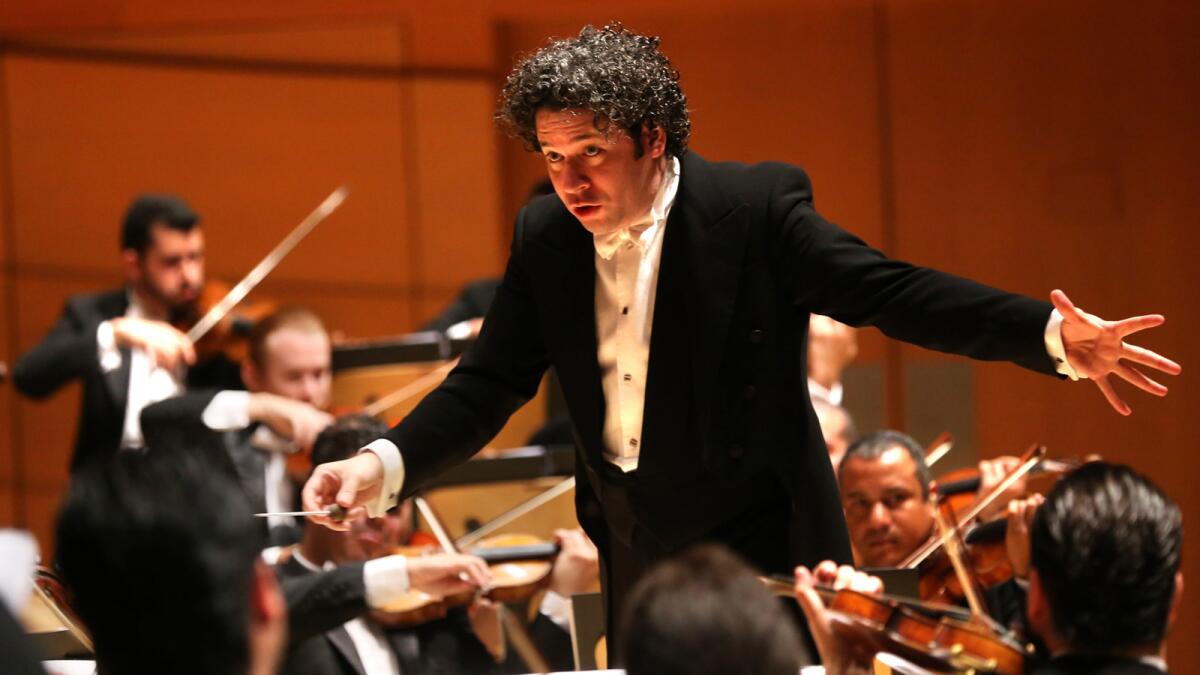Review: Dudamel and the L.A. Philharmonic deliver a riotous ‘Spring’

Gustavo Dudamel conducts the Simon Bolivar Symphony Orchestra of Venezuela at the Walt Disney Concert Hall on October 2, 2015.
- Share via
We seem so far beyond the age of orchestral scandals that it can take an exercise of imagination to fathom the Paris riot in 1913 at the premiere of “Rite of Spring.” A century later, Stravinsky’s ballet has become more popular than “Scheherazade.”
These days, young composers and orchestras everywhere court each other. The Los Angeles Philharmonic is especially beloved in L.A. for its music making, community involvement and for bringing us Walt Disney Concert Hall.
Fortunately, the L.A. Phil also happens to be the most clamorous of orchestras in its willingness to take chances and court controversy. Thursday night was no exception.
SIGN UP for the free Essential Arts & Culture newsletter >>
The crowd excitedly and inevitably cheered a riotous performance of the “Rite” conducted by Gustavo Dudamel at Disney Hall. But this concert was also a too-rare demonstration of the way the orchestra can still be an excellent and relevantly dangerous vehicle for agitation.
Dudamel couldn’t have begun more innocently with two little suites by Stravinsky for small orchestra. Each has four slight, circusy or touristy dances. Conducting without a score (who else bothers to memorize such inconsequential Stravinsky?), Dudamel poured on the musical charm.
Then came the West Coast premiere of Dutch composer Louis Andriessen’s “Mysteriën.” The half-hour score was written two years ago to celebrate the 125th anniversary of the Royal Concertgebouw Orchestra. The orchestra’s revered Latvian music director, Mariss Jansons, led the premiere.
Holland’s leading composer, Andriessen came to attention as a vehement Minimalist in the 1970s writing aggressive music often with provocative political, sexual, philosophical and spiritual contexts. But in the process he also became Holland’s leading orchestra antagonist, stubbornly preferring raucous ensembles with large sections of in-your-face brass, winds (particularly saxophones) and hard-edged percussion. He also likes sopranos who are bold, amplified and stay away from vibrato.
“Mysteriën” is the first orchestra piece Andriessen had, after much Concertgebouw cajoling, agreed to write in 45 years, and it is not celebratory. The composer has said he had a vision of his father, Hendrik Andriessen (also a noted composer), telling his son to do this piece.
The half-hour score is bleak, powerful and original. A documentary, “Imperfect Harmony” (not yet available on DVD in this country) was made about the premiere. To the end, Andriessen bucked the system (his feuds with Jansons got so bad, the orchestra management wouldn’t let the composer have any contact with the players). There is a recording of the Jansons premiere. It is not very good.
Dudamel’s performance was a vast improvement of a genuinely disturbing and haunting piece. The six movements take their titles from the writing of an obscure 15th century Dutch mystic, Thomas á Kempis. The beginning represents “despising of all vanities in the world.” After working through misery, the ordeal of love, our instinct to do bad, we reach a meditation on death.
Musically, this is a journey from clashing orchestral sections, driving rhythms and tough harmonies to uneasy quietude. At times, the textures take on Ivesian complexity and sudden switches of mood. In the third section, Kempis’ seeking truth by silencing the noise of words, things get decidedly weird.
A harp plays in one tuning against a clarinet in another, and resulting “imperfect” harmonies have an almost magical power to disorient. There are moments of unearthly (or is that über-earthy?) beauty in this movement. Quiet majesty is to be found later on in the piece. But real peace is achieved only in death. With Dudamel alert to rhythmic pulse and telling instrumental details, the L.A. Phil dug deeply, pulled no punches and left at least one listener reeling.
The “Rite” left everyone reeling. Dudamel opened the 2012 season with a brazenly over-the-top performance of Stravinsky’s score. This time, using a massively large ensemble, he created the sensation of mob rule. The orchestra could barely be contained.
Dudamel didn’t ask for beauty or sensuality (the way the “Rite” is often sold these days). The excitement came not from obsessive rhythmic control but sheer vehemence, an exhibition of uncontrollable mass psychology.
When a great work of art about our primitive urges for violence no longer shocks, that is what becomes scandalous. During the applause at the end, several players in an orchestra that eats Stravinsky for breakfast looked at one another and laughed, as if out of astonishment for the Stravinsky shock they had just managed to produce.
------------------
Gustavo Dudamel conducts the Los Angeles Philharmonic
Where: Walt Disney Concert Hall, downtown Los Angeles
When: 8 p.m. Saturday and 2 p.m. Sunday
Cost: $26.50 - $212
Info: (323) 850-2000, www.laphil.org
ALSO:
Pianist Andras Schiff mesmerizes with last sonatas of 4 composers
Music ensembles Hocket and Sakura bathe Monk Space in an acoustical glow
L.A. Phil digs into early Beethoven, explores what is immortal
More to Read
The biggest entertainment stories
Get our big stories about Hollywood, film, television, music, arts, culture and more right in your inbox as soon as they publish.
You may occasionally receive promotional content from the Los Angeles Times.











